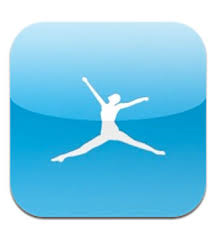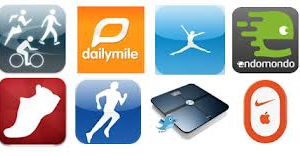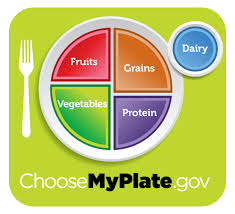 In honor of NEDA week, Brooke P. R.D. has given us some advice on when it’s best to use fitness apps, listing some of the pros and cons. Regardless, an app should help you keep track of your fitness journey, NOT obsess about calories and exercise. Is an app for you? Brooke, help us out!
In honor of NEDA week, Brooke P. R.D. has given us some advice on when it’s best to use fitness apps, listing some of the pros and cons. Regardless, an app should help you keep track of your fitness journey, NOT obsess about calories and exercise. Is an app for you? Brooke, help us out!
The Pros and Cons of using Fitness Apps
This is National Eating Disorders Awareness Week (NEDA) and to prepare for a presentation on the healthy use of fitness apps, I wanted to get a general idea of what health and fitness apps Butler students use. While the results from a Coffee Chat question and a suggestion box in the HRC are far from scientific (surprisingly, “Your Momma” is not a fitness app that I could find), the breakdown goes like this:
- 55% of the responses use some sort of health and fitness app
- 26% use the myfitnesspal app
- 13% use a Nike+ or other running app (like mapmyrun)
- A handful of others use apps like Weight Watchers, Gympact, Jefit and Charity Miles.
The fact that the majority of students who use a health and fitness app use myfitnesspal didn’t surprise me. As a dietitian and a health coach, I have found it to be one of the most popular apps clients have tried. However, I have also found that my clients either love it or hate it. It either makes meeting their goals easier, or it is far too tedious. Dietitians know the power of keeping a food journal; it is a tool that just works. A food journal encourages awareness about the food you eat, and this then allows you to become more mindful of your food intake. Regardless of the specific health and fitness goals, knowledge is the first step.
There is an app for nearly anything you could possibly want to improve your health. So, it’s important to ask yourself a few questions when choosing the app:
What are my goals?
- Do I want to learn to make healthier food choices?
- Do I want to lose or gain a few pounds?
- Do I want to be more mindful about my eating?
- Do I want to increase my fitness or add variety to my work out routine?
- Am I at risk for or have a diagnosis of a chronic disease like diabetes or high blood pressure?
- Do I want to be more aware of what I am putting in my body?
- Am I concerned about food allergies?
- Do I want to save money at the grocery store?
- Do I need help with motivation?
Does this app fit my personality and lifestyle?
- Will I get frustrated if I don’t see immediate results?
- Am I likely to become too engaged in the app and exceed healthy goals?
- Will it keep me motivated?
- Does it help to see my progress in a chart or graph?
- Do I enjoy social networking?
- Do I want have and want to take the time to log everyday?
- Do I prefer to count calories or food groups?
- Is this a short or long-term commitment?
- What happens when I get tired of using the app?
There’s an app for that, but is the app the right tool for me?
- Could I reach the same end by keeping a food journal?
- Would talking with a dietitian or counselor be more helpful?
- Can I reach my goals without being dependent upon an app?
- How can I translate what I learn from the app into the real world?
This is by no means an exhaustive list, but there are many ways to reach the same end. Apps are just one of those ways.
Pros of health and fitness apps:
- They work very well for SOME people. Remember I said some people love myfitnesspal and some hate it? Some people like instant feedback and feel more relaxed knowing that all they have to do is stay within their calorie range. This does not mean they are making healthy choices, though!
- They allow you to see where your nutrition successes and deficits are. Am I getting enough fiber each day? Am I consuming too much saturated or trans-fat? Am I meeting my calcium needs?
- Fitness apps will sync with Nike Fuel, Fitbits, Up bands that allow you to track your activity and sleep among other things. This ensures you are being more healthy overall. Sleep impacts nutrition and sitting less is as important, if not more important, than moving more.
- Barcode scanners make data entry much easier than typing.
- The apps adjust your calories as you lose weight which is particularly important if you have a higher weight loss goal.
- The formulas they use are evidenced-based. The Mifflin-St. Jeor equation is most commonly used. However, it’s accuracy depends, to an extent, on the activity factor chosen. Another equation is usually more appropriate for athletes.
Cons to health and fitness apps:
- Apps can be tedious, especially when getting started; tracking one’s food intake takes time! Like any habit, it gets easier and faster, but expect a time commitment up front, especially if you cook from recipes.
- They may encourage excessive calorie counting; it’s important to look at one’s diet over a longer term. What a person eats in one day will not dictate the healthiness of their overall diet.
- They often encourage a lower calorie intake for faster weight loss. Again, this depends on the goals you input. Losing 1-2 pounds per week requires a lower calorie intake than 1-2 pounds per month.
- They require an accurate estimate of serving sizes; an app is only as good as the input it receives. You create that input!
- Calories and nutrition are both important; if you focus too much on one or the other, it can be unhealthy. For example, you can have a well rounded diet, but eat too many calories, or you can reach your target calories each day, but lack nutrients, antioxidants and fiber. It doesn’t always tell you if you are eating enough fruits and vegetables–only if you are getting enough of certain vitamins and minerals. You need to know what foods contain these vitamins & minerals or macronutrients to improve your nutrition.
- They may over or underestimate calories burned; everyone has a different body composition and metabolic rate. Apps take some of this information into consideration when they ask for your gender, height, weight age and activity level. However, they do not consider genetics, medications, and other subtle differences that make you unique! For example: myfitnesspal uses the Mifflin-St. Jeor equation to estimate resting metabolic rate (RMR), then it multiplies that number by an activity factor, based on the feedback you provide. A jump from a 1.4 to 1.6 activity level can increase calories by about 200 each day. Keep in mind that an app is geared to make you successful. If it weren’t, you wouldn’t keep using it!.
- They may create dependence. What happens when you get tired of it or go on vacation? It’s important to be able to translate what the app is doing into real knowledge. Do you really want to track your calorie intake on vacation? In this regard, learning how to estimate portion sizes and make healthy choices is a much better tool.
- If you are an athlete, have a chronic disease or other illness, the apps may not be accurate for you. An app should never replace personalize counseling or medical care. Keeping your doctor and dietitian abreast of your health and fitness goals is also important!
What are the alternatives?
- Consult a dietitian to get an individualized plan. Nutrition is a science, but putting nutrition into practice involves behavior change. Many people focus too much on the numbers in calories and nutrient intake levels, but not enough on healthy behaviors. For example, consider the person who is solely focused on losing weight by tracking calories on myfitnesspal. Once the weight is lost, then he wants to deal with the behavior change. How successful do you think this person will be successful in the long term?
- Follow a component-based food plan like MyPlate. Think about eating balanced meals everyday based on getting enough fruits and vegetables, whole grains, protein, dairy, fish and healthy fats. This allows you to eat all foods in moderation and get the most nutrition bang for your buck!
- Evidenced-based books and websites may also provide a wealth of information on how to make healthier choices. How to shop a grocery store, eat a more plant-based diet, track food intake, or make behavior changes. Some of these can have the same pitfalls as an apps, but they may offer a slightly different approach and different resources.
To app or not to app?
That is the question. Again, I urge you to think about what your goals are and consider if they are realistic. Setting unrealistic goals often leads to failure. It is far more fun to be successful, and starting small and learning to love yourself for who you are today encourages success. If using a health and nutrition app helps in that process, then they can be great tools. Just as we cannot determine our height, though, we cannot always change whether the fat comes and goes to our front or back side!
I leave you with this thought….A Today Show survey this week found that age 27 is the age at which most people are the happiest with their bodies. For many of you, that is 5-9 years away. Why not start loving your body now? Fuel your body with healthy foods everyday, move it more and spend more time enjoying the moment and the gifts you have today. If an app helps you do that, terrific! If not, consider the alternatives and set yourself up for success!
Thank you Brooke! See you next month!


